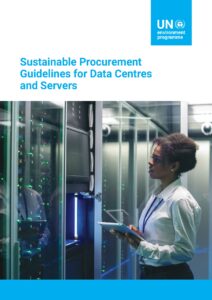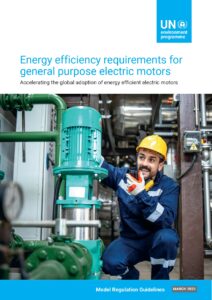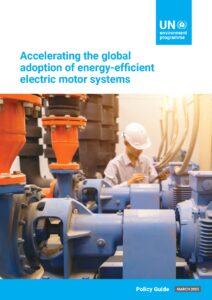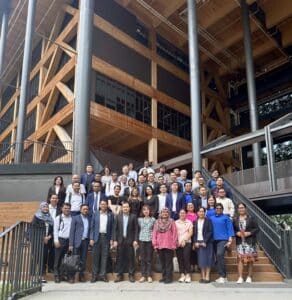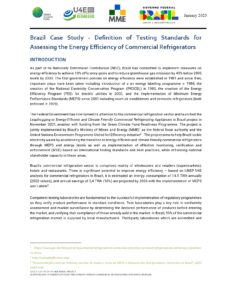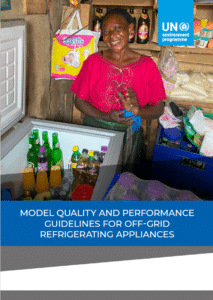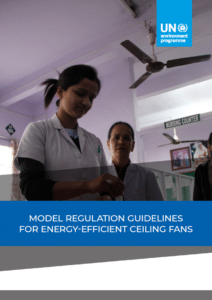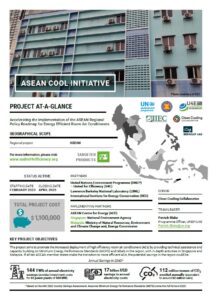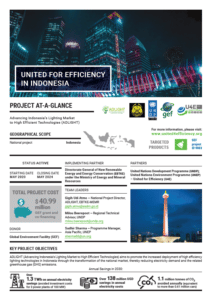Data centres in developing countries are set to grow rapidly due to economic expansion, rising data demand (AI, edge computing, cryptocurrencies), and increasing data sovereignty needs. However, these facilities are highly energy-intensive, with IT equipment consuming 40–70% of total energy and cooling systems using 20–50%. The International Energy Agency estimates that data centres will drive more than 20 per cent of the growth in electricity demand between now and 2030, with demand possibly ...Read More
Energy efficiency requirements for general purpose electric motors: Accelerating the global adoption of energy efficient electric motors
These Guidelines are an update of the original report published in 2017, to assist developing countries and emerging economies transform their markets to adopting energy efficient motor systems. The Guidelines provide ready templates to set minimum efficiency performance standards (MEPS) for (a) induction motors, (b) variable speed drives, (c) fans driven by motors with an electric input power between 125 W and 500 kW, (d) rotodynamic water pumps for pumping clean water, and (e) air compressor ...Read More
Accelerating the global adoption of energy-efficient electric motor systems
This document provides an overall reference source for policymakers in developing countries and emerging economies to transition to energy-efficient motor systems. It offers an overview of all key elements for transforming a national motor market towards higher efficiency through the application of the Integrated Policy Approach. It notes the many existing best practice examples, resources, and tools that are available for policymakers to use. Download Motors Policy Guide ...Read More
Video – Study Tour in Singapore Drive Enhanced MEPS in Southeast Asia
On November 5-6, UNEP-U4E, under the ASEAN Cool Initiative, and UNEP OzonAction jointly led a Study Tour in Singapore, aimed at fostering knowledge exchange, sharing best practices, and enhancing understanding of regulatory frameworks for implementing and enforcing enhanced Minimum Energy Performance Standards (MEPS) across the region. The tour showcased Singapore’s success in meeting the Regional Phase II MEPS targets, offering a model for other ASEAN countries. See below a video of the ...Read More
Brazil Case Study – Definition of Testing Standards for Assessing the Energy Efficiency of Commercial Refrigerators
This case study provides insight from the Brazilian delegation’s study tour on Testing Standards for Commercial Refrigerators at Re/gent Laboratory in the Netherlands and the conclusions from a comparative study on testing procedures conducted by the national laboratory, CEPEL, to support the development of Brazil’s national test standards. The training programme included complementary activities in Brazil after the study tour, in collaboration with U4E, to support the successful development ...Read More
Advancing Air Conditioners’ Energy Efficiency Regulation, Compliance and Enforcement
Implementation of key recommendations from the National Cooling Action Plan under the Project “Scaling Up Sustainable Cooling in Nigeria’s Nationally Determined Contribution” This document, developed in the context of the Scaling Up Sustainable Cooling in Nigeria’s Nationally Determined Contribution project led by the Energy Commission of Nigeria in partnership with UNEP-U4E proposes the strategies and rationale to implement the Nigerian Cooling Action Plan (N-CAP) recommendations on ...Read More
Model Quality and Performance Guidelines for Off-Grid Refrigerating Appliances
Refrigerating appliances are among the most desirable but expensive appliances that small enterprises and households aspire to own once electricity becomes available and incomes rise beyond subsistence. While research indicates a large market opportunity for off-grid refrigerating appliances, observed market penetration is still very low with annual sales roughly estimated at ~12-31 thousand units, compared to about 200 million grid-connected units worldwide. One reason for this is user ...Read More
Model Regulation Guidelines for Energy-Efficient Ceiling Fans
Ceiling fans are a low-cost cooling option which enhance indoor comfort with a power consumption typically less than 90 watts compared to room AC systems which typically have a consumption of around 1500 watts. In countries such as India, they make up a substantial portion of residential electricity demand. There are approximately $8 billion in annual global sales of ceiling fans, and in most markets these products are unregulated beyond basic safety requirements, so there is a great ...Read More
Accelerating the implementation of the ASEAN Regional Policy Roadmap for Energy Efficient Room Air Conditioners
ASEAN Cool Initiative aims to accelerate the implementation of the ASEAN Regional Policy Roadmap for Energy Efficient Room Air Conditioners by providing technical assistance and capacity building for MEPS and labels in the region. It will be implemented by the ASEAN Centre for Energy (ACE) across the region, with support from U4E, Lawrence Berkeley National Laboratory (LBNL) and the International Institute for Energy Conservation (IIEC). Across the ASEAN region, the project will accelerate the ...Read More
Advancing Indonesia’s Lighting Market to High Efficient Technologies
This factsheet provides a summary of the Advancing Indonesia’s Lighting Market to High Efficient Technologies (ADLIGHT) project which aims to reduce electricity demand and related greenhouse gas emissions by promoting increased use of high efficiency lighting technologies through the transformation of the national market. Download factsheet ...Read More
- 1
- 2
- 3
- …
- 8
- Next Page »
